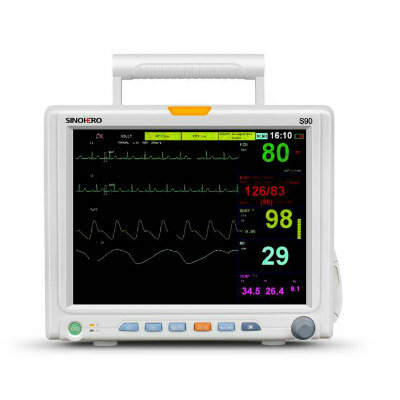Versatile Smart Patch Combines Health Monitoring and Drug Delivery
|
By HospiMedica International staff writers Posted on 05 Feb 2025 |

As the global population ages, the need for personalized healthcare is becoming increasingly important. This shift has fueled a growing interest in wearable medical devices that can provide real-time health monitoring and enable immediate treatment. However, current wearable devices often face limitations, either focusing solely on biometric signal detection or drug delivery, with challenges in integrating both functions into a compact and stable design. In response to these challenges, researchers have now developed an innovative smart patch that combines real-time biometric signal monitoring with drug delivery capabilities.
Developed by scientists at Daegu Gyeongbuk Institute of Science and Technology (DGIST, Daegu, South Korea), this patch integrates a range of sensors and a drug delivery system into a single, foldable unit. This allows for real-time cardiovascular health monitoring and the ability to administer medication instantly when necessary. By incorporating electrical and optical biometric signal sensors, a drug delivery system, and a wireless communication module into the foldable design, the patch can automatically dispense drugs in response to real-time biometric signals, providing a personalized treatment tailored to the user's health needs.
The performance of the smart patch was validated through experiments focused on real-time biometric signal measurement and drug delivery. The results of the study, published in Nature Communications, confirmed the successful monitoring of electrocardiograms and blood flow, along with precise analyses of heart rate variability and pulse transit time. Furthermore, the researchers demonstrated the patch's ability to deliver drugs automatically based on the collected biometric data. The research team anticipates that this technology will have broad applications in various medical areas, including glucose regulation, pain management, and the treatment of chronic conditions.
“The smart patch developed in this study integrates biometric signal measurement and drug delivery into a single system, with high applicability across various medical fields, such as blood pressure control, glucose management, pain relief, and chronic disease treatment,” said DGIST Professor Kyung-In Jang who led the research team. “It enables real-time, personalized treatment.” He added, “Moving forward, we plan to further develop this technology into an intelligent healthcare platform applicable to diverse medical areas.”
Latest Critical Care News
- Mass Manufactured Nanoparticles to Deliver Cancer Drugs Directly to Tumors
- World’s Smallest Pacemaker Fits Inside Syringe Tip

- AI-Powered, Internet-Connected Medical Devices to Revolutionize Healthcare, Finds Study
- Starfish-Inspired Wearable Tech Enables Smarter Heart Monitoring
- AI Eye Scans Could Help Identify Heart Disease and Stroke Risk
- Digital Heart Twin Improves Diagnosis and Treatment of Cardiac Arrhythmias
- First-Of-Its-Kind AI-Powered Probability Scoring System Assesses Heart Failure with Preserved Ejection Fraction
- AI-Assisted Colonoscopy Detects More Polyps but Has Modest Effect on Cancer Risk
- Wearables Could Reduce Need for Continuous Blood Thinners in Patients with Atrial Fibrillation
- AI Model Provides Real-Time Sepsis Risk Alerts for Improving ICU Patient Survival
- AI Algorithm Improves Intravenous Nutrition for Premature Babies
- Smart Mirror Generates AI-Powered Health Insights by Analyzing Facial Blood Flow
- Painless Diabetes Patch to Replace Needle Pricks

- Sensory T-Shirt Monitors Patient’s Vitals After Urological Surgery for Cancer
- Super-Sensitive Radar Technology Warns of Serious Heart Issues
- Thermal Imaging Could Accurately Track Vital Signs for Early Disease Detection
Channels
Critical Care
view channel
Mass Manufactured Nanoparticles to Deliver Cancer Drugs Directly to Tumors
Polymer-coated nanoparticles loaded with therapeutic drugs hold significant potential for treating cancers, including ovarian cancer. These particles can be precisely directed to tumors, delivering their... Read more
World’s Smallest Pacemaker Fits Inside Syringe Tip
After heart surgery, many patients require temporary pacemakers either to regulate the heart rate while waiting for a permanent pacemaker or to support normal heart rhythm during recovery.... Read more
AI-Powered, Internet-Connected Medical Devices to Revolutionize Healthcare, Finds Study
A new study suggests that artificial intelligence (AI)-powered, internet-connected medical devices have the potential to transform healthcare by enabling earlier detection of diseases, real-time patient... Read moreSurgical Techniques
view channel
New Transcatheter Valve Found Safe and Effective for Treating Aortic Regurgitation
Aortic regurgitation is a condition in which the aortic valve does not close properly, allowing blood to flow backward into the left ventricle. This results in decreased blood flow from the heart to the... Read more
Minimally Invasive Valve Repair Reduces Hospitalizations in Severe Tricuspid Regurgitation Patients
The tricuspid valve is one of the four heart valves, responsible for regulating blood flow from the right atrium (the heart's upper-right chamber) to the right ventricle (the lower-right chamber).... Read morePatient Care
view channel
Portable Biosensor Platform to Reduce Hospital-Acquired Infections
Approximately 4 million patients in the European Union acquire healthcare-associated infections (HAIs) or nosocomial infections each year, with around 37,000 deaths directly resulting from these infections,... Read moreFirst-Of-Its-Kind Portable Germicidal Light Technology Disinfects High-Touch Clinical Surfaces in Seconds
Reducing healthcare-acquired infections (HAIs) remains a pressing issue within global healthcare systems. In the United States alone, 1.7 million patients contract HAIs annually, leading to approximately... Read more
Surgical Capacity Optimization Solution Helps Hospitals Boost OR Utilization
An innovative solution has the capability to transform surgical capacity utilization by targeting the root cause of surgical block time inefficiencies. Fujitsu Limited’s (Tokyo, Japan) Surgical Capacity... Read more
Game-Changing Innovation in Surgical Instrument Sterilization Significantly Improves OR Throughput
A groundbreaking innovation enables hospitals to significantly improve instrument processing time and throughput in operating rooms (ORs) and sterile processing departments. Turbett Surgical, Inc.... Read morePoint of Care
view channel
Handheld, Sound-Based Diagnostic System Delivers Bedside Blood Test Results in An Hour
Patients who go to a doctor for a blood test often have to contend with a needle and syringe, followed by a long wait—sometimes hours or even days—for lab results. Scientists have been working hard to... Read moreBusiness
view channel
Expanded Collaboration to Transform OR Technology Through AI and Automation
The expansion of an existing collaboration between three leading companies aims to develop artificial intelligence (AI)-driven solutions for smart operating rooms with sophisticated monitoring and automation.... Read more

















